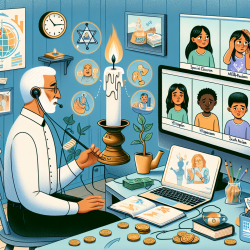The COVID-19 pandemic has underscored the critical role of vaccines in public health. As a practitioner, staying informed about factors influencing vaccine acceptance can enhance your ability to communicate effectively with clients and stakeholders. A recent study titled "Correlates of Covid-19 Vaccine Acceptance among Residents of Ohio: A Cross-sectional Study" provides valuable insights that can be leveraged to improve vaccination uptake and address hesitancy.
The Importance of Understanding Vaccine Acceptance
With a significant portion of the population hesitant or unwilling to receive the COVID-19 vaccine, understanding the underlying reasons is crucial. The Ohio study highlights that only 59.1% of participants expressed willingness to be vaccinated. This statistic reveals a gap that practitioners can help bridge through informed communication and targeted interventions.
Sociodemographic Factors
The study identifies key sociodemographic factors affecting vaccine acceptance:
- Age: Younger individuals are less likely to accept vaccination compared to those aged 55 and older.
- Gender: Females show lower acceptance rates than males.
- Race/Ethnicity: Non-Hispanic blacks are less likely to accept the vaccine compared to non-Hispanic whites.
- Marital Status: Never married or previously married individuals show lower acceptance rates compared to married individuals.
- Education: Individuals with less than high school education are less likely to accept the vaccine compared to those with higher education levels.
The Role of Knowledge and Trust
The study also emphasizes the importance of knowledge and trust in influencing vaccine acceptance:
- Knowledge about COVID-19: Increased knowledge correlates with higher acceptance rates.
- Behavioral Adherence: Adherence to preventive behaviors is associated with greater likelihood of accepting the vaccine.
- Trust in Government Messages: Trust in messages from the government significantly impacts acceptance rates.
Implications for Practitioners
The findings from this study offer actionable insights for practitioners looking to improve their skills and contribute to public health efforts:
- Cultural Sensitivity: Tailor communication strategies to address specific concerns of different demographic groups, particularly focusing on culturally tailored messages for minority populations.
- Educational Initiatives: Develop programs aimed at increasing knowledge about COVID-19 and vaccines, especially targeting groups with lower educational attainment.
- Building Trust: Work on building trust in government and healthcare systems through transparent communication and addressing historical mistrust issues.
- Youth Engagement: Engage younger populations through platforms they frequent, using relatable content that highlights the benefits of vaccination for community health.
The Path Forward
This research underscores the need for targeted health promotion campaigns that consider sociodemographic factors and leverage modifiable variables like knowledge and trust. As a practitioner, staying informed about such studies can enhance your ability to support public health initiatives effectively.
If you're interested in delving deeper into this research, consider exploring further studies or conducting your own research within your community. Understanding local nuances can provide additional insights into improving vaccine uptake and addressing hesitancy effectively.
Correlates of Covid-19 Vaccine Acceptance among Residents of Ohio: A Cross-sectional Study










